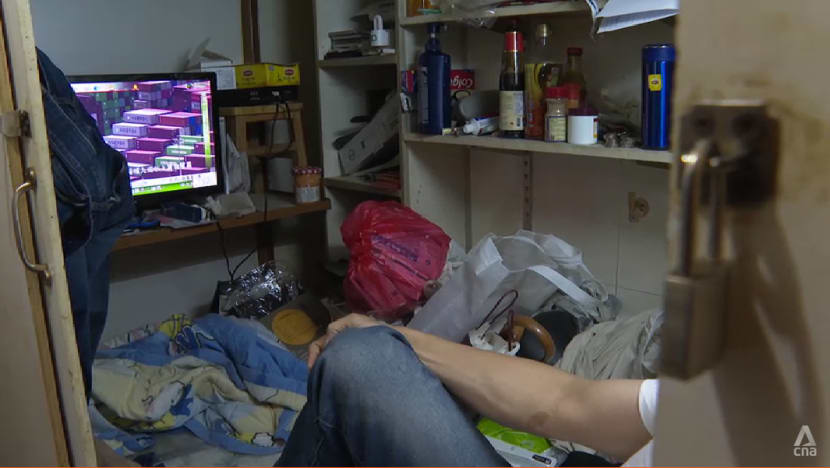Commentary: Hong Kong’s plan to phase out shoebox homes may hurt tenants
When Hong Kong’s new regulations on subdivided units kick in, tenants may have to pay more to continue living in them, says University of Minnesota PhD student John Hanzhang Ye.


This audio is generated by an AI tool.
MINNEAPOLIS, Minnesota: In Hong Kong, the topic of subdivided flats - or “shoebox homes” - always raises heated discussion.
In his latest policy address, Hong Kong Chief Executive John Lee announced new regulations aimed at phasing out subdivided flats from the city.
Subdivided flats are a major source of housing for low-income households. The flats are usually rented out to unrelated individuals, who may be crammed into spaces that barely fit one bed. Many subdivided flats are in core residential areas in Hong Kong, featuring convenient access to wet markets, train stations, schools and business areas.
According to a survey by Hong Kong’s Census Department in 2021, there are around 108,000 subdivided units accommodating over 200,000 persons. The median floor area of each unit is 11 sq m, while the median per capita floor area is 6 sq m.
For the first time, the government will impose minimum living standards on subdivided units, including the provision of windows, an individual toilet, and a floor area of no less than 8 sq m - the size of two king-sized beds. Landlords will be given a grace period to comply with new rules, and subdivided units will henceforth be redesignated as Basic Housing Units.
Deputy Financial Secretary Michael Wong Wai-lun said that 70 per cent of existing subdivided units already meet the requirements, while the rest would require minor fixes. In Mr Wong’s estimation, subdivided units will gradually phase out with the provision of public rental housing.
LONG WAITING LIST FOR PUBLIC RENTAL HOUSING
In his policy address, Mr Lee said that 30,000 new public housing units will be completed by 2028.
Hong Kong’s public rental housing system has an income ceiling for applicants, depending on their household size and type. The waiting list for public rental housing is still long. There are a total of 123,100 applications from families and the elderly, and 91,500 applications from non-elderly singles.
For family applications, the current waiting time is 5.5 years. Mr Lee said that this would be shortened to 4.5 years by 2027 when more public housing units are available.
Not all those who live in subdivided units are eligible for public rental housing. Michael Wong estimates that 60 per cent of tenants are eligible, but he did not comment on the remaining 40 per cent. Without the affordable option of renting public housing or subdivided flats, these tenants must seek more expensive accommodation in the private home rental market.
Moreover, the Census Department’s 2021 survey indicates that 21.2 per cent of households have at least one member residing in Hong Kong for less than seven years, which disqualifies them from most of Hong Kong’s social benefits. Such households who fall in the low-income category may find themselves in a precarious situation when tighter regulations for subdivided units kick in.
AFFORDABLE HOUSING REMAINS AN ISSUE
Tenants living in non-compliant subdivided units may have to pay more to continue living in a Basic Housing Unit. Landlords would have to reduce the number of subdivided units within a property, which will drive rental prices up.
It is unclear whether the government can provide transitional and affordable housing for those who are forced to leave. Those who are neither eligible for public housing nor able to find an affordable home might have to resort to the illegal rental market.
Advocacy groups expressed concern over finding new accommodation for tenants. ComHome Social Realty is a social real estate agency aimed at matching low-income households with affordable housing.
Since the group’s founding in 2023, among some 300 participants, only 17 managed to find their match. This low success rate is a result of the sheer discrepancy between participants’ financial ability and home rental prices.
In July, the median rent for subdivided units in Hong Kong Island was HK$7,000 (US$900) per month, while that in Kowloon reached HK$5,300 per month.
Statistics in 2021 indicate that the median monthly household income of tenants of subdivided units is HK$15,310. Assuming their incomes rose alongside average wage growth from 2021 to 2024, this figure is currently HK$16,160. That means that a sizeable one-third to half of their income goes into the rent for a subdivided unit.
The 2024 policy address shows the government’s resolution to solve Hong Kong’s housing issues. The introduction of the Basic Housing Units is a fresh start, and Hong Kong is on its way to build more houses.
But with the extreme imbalance between the demand for housing in central areas and the chronic shortage of affordable options, housing for Hong Kong’s most vulnerable individuals will continue to be an issue in the foreseeable future.
John Hanzhang Ye is a PhD candidate in the History of Science, Technology and Medicine programme at the University of Minnesota.











